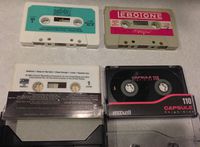Audio Cassette
Dan Tobias (Talk | contribs) (→Links and resources) |
m |
||
| Line 10: | Line 10: | ||
In early home and hobby computers of the 1970s and 1980s, audio cassettes were often used as a data storage medium, until disk drives became sufficiently available and affordable to become the dominant means of storage. | In early home and hobby computers of the 1970s and 1980s, audio cassettes were often used as a data storage medium, until disk drives became sufficiently available and affordable to become the dominant means of storage. | ||
| − | =Types= | + | ==Types== |
* [[Type I audio cassette]] | * [[Type I audio cassette]] | ||
* [[Type II audio cassette]] | * [[Type II audio cassette]] | ||
| Line 16: | Line 16: | ||
* [[Microcassette]] | * [[Microcassette]] | ||
| − | =Audio quality= | + | ==Audio quality== |
* [[Cassette bias and equalization]] | * [[Cassette bias and equalization]] | ||
* [[Dolby noise reduction]] | * [[Dolby noise reduction]] | ||
* [[Head alignment (azimuth)]] | * [[Head alignment (azimuth)]] | ||
| − | =Data formats= | + | ==Data formats== |
A number of early personal computers used audio cassettes to store programs and data. See also [[Magnetic tape data storage]]. There was even some use of [http://blog.modernmechanix.com/the-floppy-rom-software-distributed-on-records/ vinyl records] as a means of storing data in similar format to cassettes. | A number of early personal computers used audio cassettes to store programs and data. See also [[Magnetic tape data storage]]. There was even some use of [http://blog.modernmechanix.com/the-floppy-rom-software-distributed-on-records/ vinyl records] as a means of storing data in similar format to cassettes. | ||
| Line 40: | Line 40: | ||
* [[ZX Spectrum BLK format data cassette]] | * [[ZX Spectrum BLK format data cassette]] | ||
| − | =Sticky-shed syndrome= | + | ==Sticky-shed syndrome== |
Sticky-shed syndrome is a condition created by the deterioration of the binders in a magnetic tape, which hold the iron oxide magnetizable coating to its plastic carrier. | Sticky-shed syndrome is a condition created by the deterioration of the binders in a magnetic tape, which hold the iron oxide magnetizable coating to its plastic carrier. | ||
| − | =Links and resources= | + | ==Links and resources== |
| − | * [ | + | * [[Wikipedia:Compact Cassette|Compact Cassette (Wikipedia)]] |
| − | * [ | + | * [[Wikipedia:Sticky-shed syndrome|Sticky-shed syndrome]] |
* [http://boingboing.net/2012/12/07/sony-ceases-production-on-cass.html Sony ceases production on cassette player/recorders] | * [http://boingboing.net/2012/12/07/sony-ceases-production-on-cass.html Sony ceases production on cassette player/recorders] | ||
* [https://discussions.apple.com/thread/1551414?start=0&tstart=0 Discussion on digitizing audio cassettes with a Macintosh] | * [https://discussions.apple.com/thread/1551414?start=0&tstart=0 Discussion on digitizing audio cassettes with a Macintosh] | ||
Revision as of 13:45, 12 September 2016
An audio cassette, AKA "Compact Cassette", was a popular medium for sound recording from the mid-1960s through the 1990s. Originally designed for such uses as office dictation (replacing earlier technologies such as the Dictabelt), it eventually achieved greater sound quality to permit it to be used for music, both for home recording, where it replaced reel-to-reel tape decks, and for sales of prerecorded music, where it was used alongside 8-Track tapes and vinyl records, and later CDs. Like all physical media, it has declined in use in recent years in favor of digital data.
In early home and hobby computers of the 1970s and 1980s, audio cassettes were often used as a data storage medium, until disk drives became sufficiently available and affordable to become the dominant means of storage.
Contents |
Types
Audio quality
Data formats
A number of early personal computers used audio cassettes to store programs and data. See also Magnetic tape data storage. There was even some use of vinyl records as a means of storing data in similar format to cassettes.
- APF Imagination Machine data cassette
- Apple II data cassette
- Atari data cassette
- CCE MC-1000 data cassette
- Coleco Adam Digital Data Pack (DDP; note: required special high-density preformatted cassette, but physical shape was the same)
- Colour Genie data cassette
- Commodore data cassette
- CUTS data cassette (used on various 1970s-era systems)
- IBM PC data cassette
- Kansas City Standard data cassette (used on SOL-20, Exidy Sorcerer, and others)
- KIM-1 data cassette
- TRS-80 Color Computer data cassette
- TRS-80 data cassette
- Video Genie data cassette
- ZX Spectrum BLK format data cassette
Sticky-shed syndrome
Sticky-shed syndrome is a condition created by the deterioration of the binders in a magnetic tape, which hold the iron oxide magnetizable coating to its plastic carrier.
Links and resources
- Compact Cassette (Wikipedia)
- Sticky-shed syndrome
- Sony ceases production on cassette player/recorders
- Discussion on digitizing audio cassettes with a Macintosh
- Portable USB record player / cassette deck
- You will never buy another record! (Vintage ad)
- Lamps made from cassette tapes
- Playback: magazine on cassette
- Cassette: A Documentary
- Electronic music group Datassette - their name perhaps implies they think their music sounds like a computer-data cassette?
- Gallery of skulls and skeletons created with melted-down cassettes
- The awesome 'Guardians of the Galaxy' mixtape will be released on cassette
- The last audio cassette factory (video)
- Project C-90: An Ultimate Audiotape Guide
